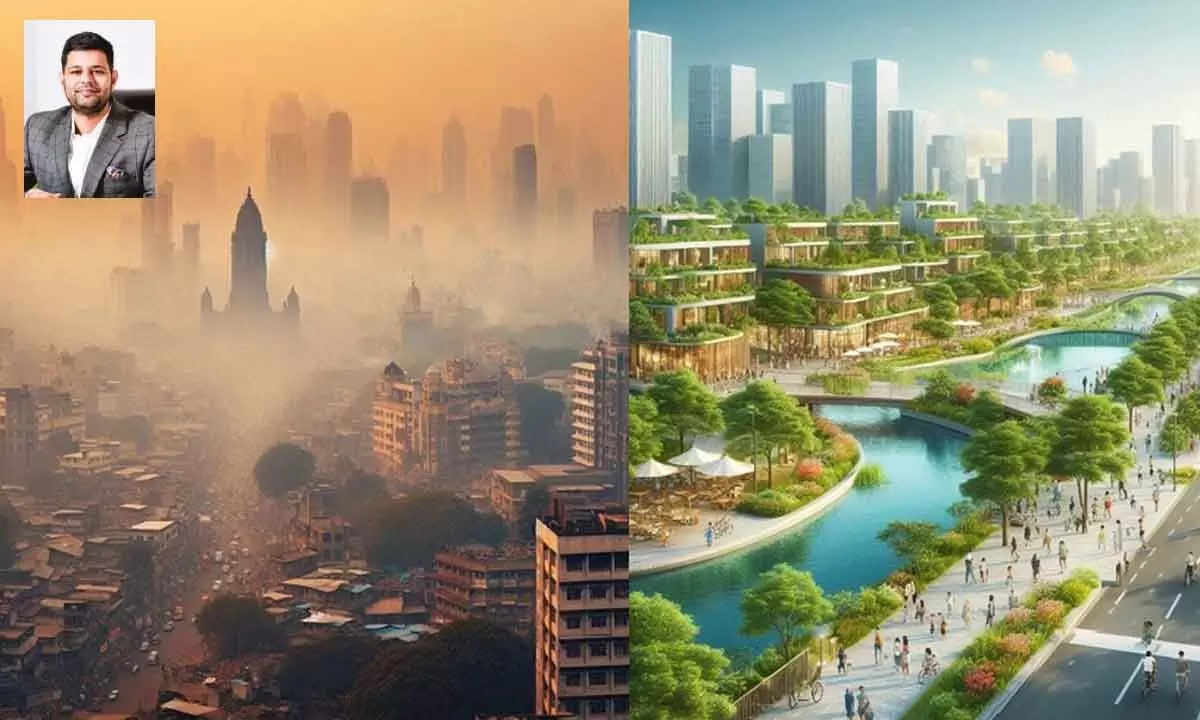Breathing Easy: Housing choices amid poor air quality in major cities
Many suburban areas with lower population density and more green open spaces offer relief from urban pollution
image for illustrative purpose

In the absence of planned development, many suburban paradises are at risk. Rapid real estate development will eventually turn green sanctuaries into polluted urban-like environments
The problem of rapidly worsening air quality in India has a direct correlation to our housing choices. Increasing urbanisation, industrial proliferation and population growth are causing more and more homebuyers to prioritize the quality of their living environments.
Urban centres - The worst hit
Indian city centres face severe air pollution threat in the following manner:
• Heavy Traffic - The congested city centres with high population and traffic density contribute significantly to vehicular emissions.
• Industrial pollution - Proximity to industrial zones with obsolete or nonexistent pollution control measures worsens air quality.
• Urban heat island effect - The concentration of buildings and human activities in cities leads to higher temperatures - which, in turn, escalate pollution levels.
• Lack of green spaces - The absence of parks and green areas in densely populated urban regions makes natural air filtration impossible.
A shift towards cleaner surroundings
Many suburban areas with lower population density and more green open spaces offer relief from urban pollution. Planned cities, like Chandigarh, Navi Mumbai and PCMC (Pimpri Chinchwad Municipal Corporation) showcase the effective separation of residential and industrial zones, improving overall air quality for all concerned.
In the absence of planned development, many suburban paradises are at risk. Rapid real estate development will eventually turn green sanctuaries into polluted urban-like environments.
Exploring the solution - Integrated townships
To tackle this issue, the Indian residential real estate sector has introduced integrated townships as a solution that can withstand environmental challenges.
1. Captive green spaces - These townships prioritize green open spaces like parks and gardens to create an environmentally sustainable environment.
2. Reduced vehicle emissions - Because they incorporate schools, shops and recreational facilities within their precincts, townships reduce overall vehicle movement.
3. Sustainable infrastructure - Initiatives like rainwater harvesting and waste recycling promote eco-friendly living practices.
4. Combating urban heat islands - Development plans for townships include extensive green areas, tree-lined streets, natural or artificial water bodies, and renewable energy sources to combat heat accumulation. By securing these advantages, integrated townships ensure that the area remains eco-friendly - now and in the future.
Tips for prospective home buyers to avoid air pollution risks
• Begin by examining air quality data for different regions. This information is often accessible through environmental monitoring agencies or online air quality indices. Check websites that offer real-time air quality updates to evaluate current atmospheric conditions.
• When selecting locations, consider the presence of green spaces. Look for areas close to parks, reserved forests, and other open green zones, as they result in better overall air quality. Don't choose a home in a project too close to a highway or an industrial zone, or prone to traffic bottlenecks. Also note that elevated areas often offer better air quality because heavy pollution smog primarily settles in low-lying areas.
• Evaluate the condition of roads and public transportation as this will determine how much emissions accumulate in an area. Do internet research and check news to review the area's infrastructure and future development plans to anticipate changes that could impact air quality.
• When checking out a home, find out if it has adequate cross-ventilation and good green home features. Energy-efficient homes typically provide better air quality thanks to their sealed and insulated environments.
You can, to some extent, enhance indoor air quality by using indoor plants. But this is obviously a very minimal solution to a major problem
In conclusion
With air quality playing an important role in home purchasing choices, buyers must prioritise features that ensure a clean and healthy living environment.
By picking the right location and project, you can protect your and your family's well-being and still enjoy the conveniences of modern life. Opting for integrated township living is a wise decision amid rapidly declining air quality in urban India. In any case, make any housing with a lot of research and awareness about air quality.
And remember - the clean environment you get in a currently green but quickly developing suburb may not be guaranteed tomorrow. Ensure that your loved ones can breathe freely – not only today but also in the future.
(The author is Managing Director of Pharande Spaces)

